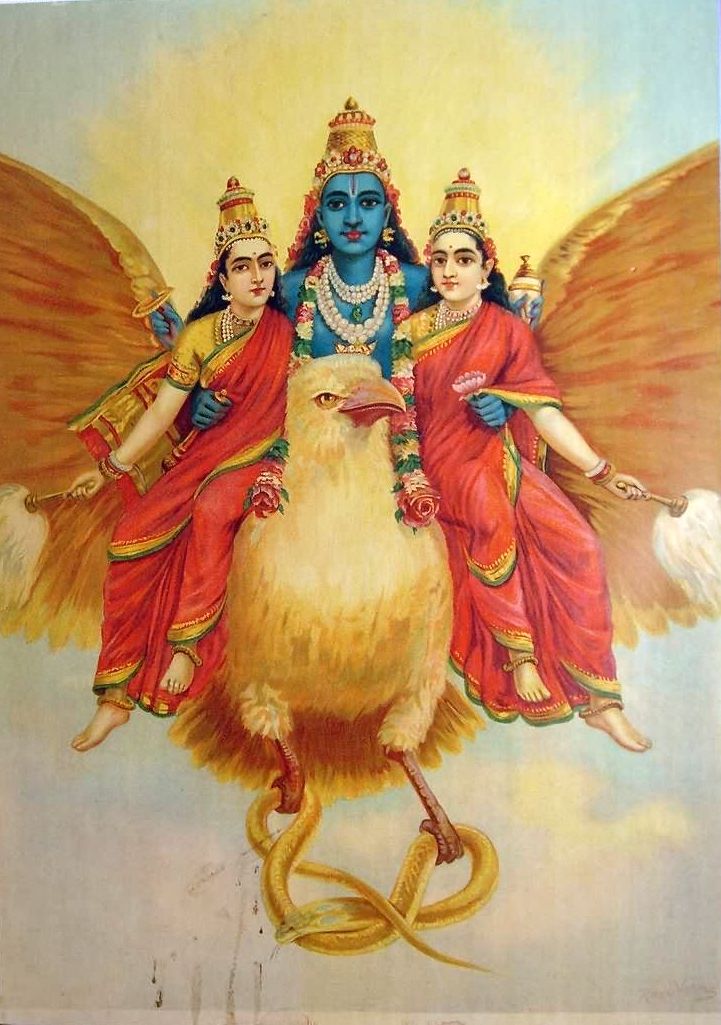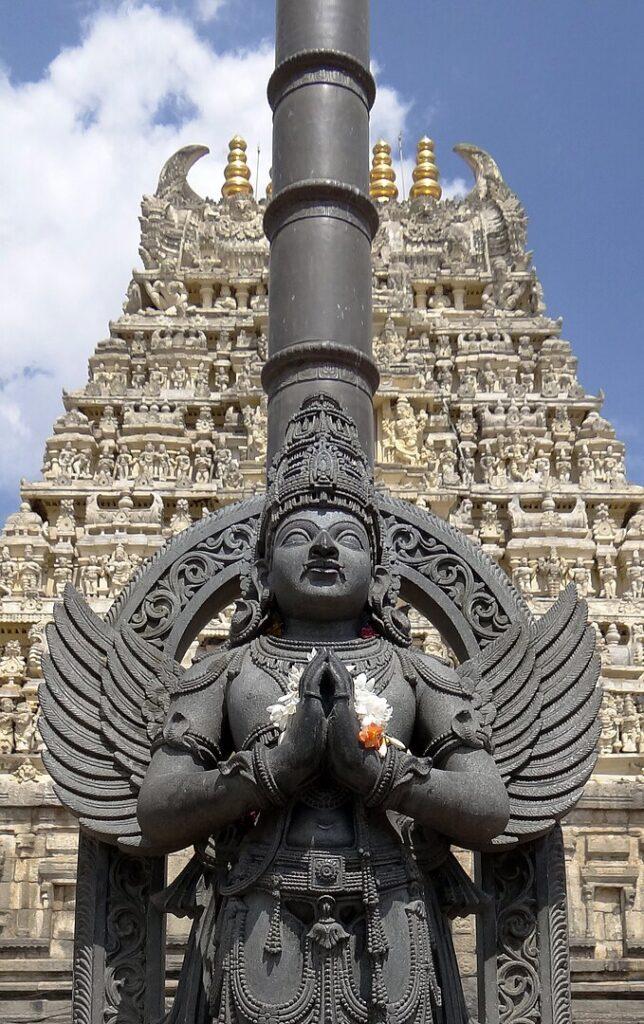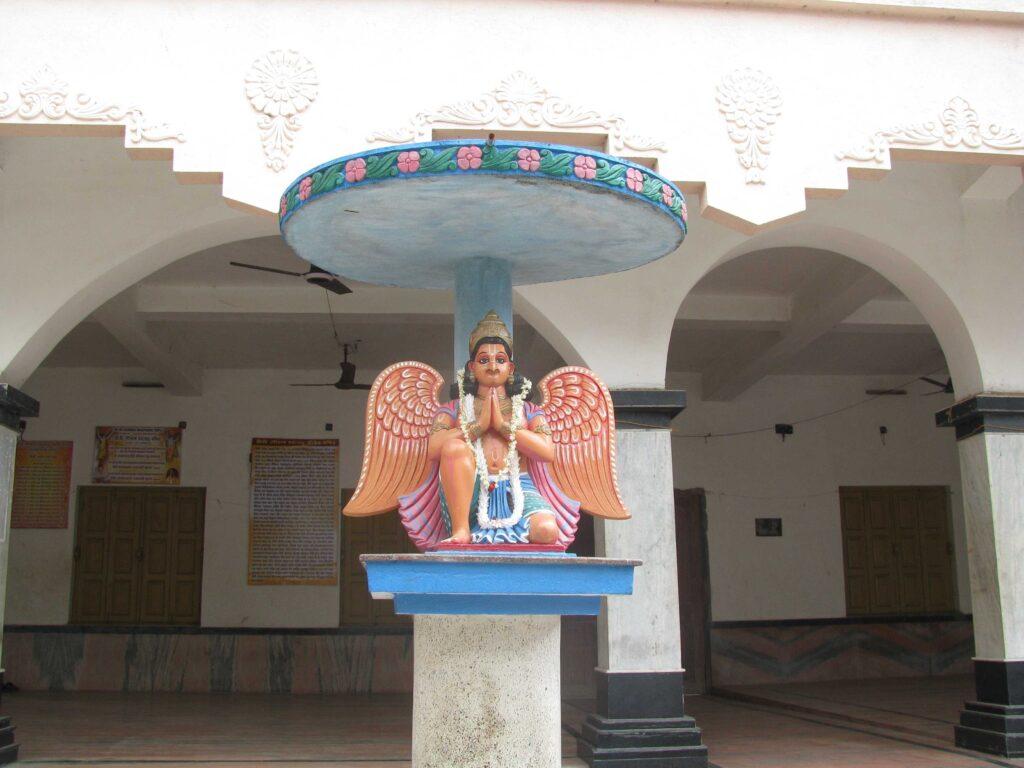
There exist various manifestations of the Supreme Lord, as described in the scriptures. According to the sacred texts, Garuda (the divine carrier of Lord Vishnu), Lord Shiva, and Ananta are all potent incarnations representing the Brahman aspect of the Lord. Garuda Panchami is a significant festival observed to commemorate the birth of Garuda, a devoted celestial bird who bears Lord Vishnu. This auspicious occasion is celebrated on the fifth day of the waxing moon in the month of Shravana. Garuda, known by various names such as Pakshiraja, Suparna, and Vishnuvahana, holds a special place in the hearts of devotees. His annual celebration on Garuda Panchami involves elaborate rituals and offerings as a mark of reverence.
Garuda, known as the son of Vinata (also called Suparna) and her husband Kasyapa, serves as the divine carrier of Lord Vishnu. He is also the sibling of Aruna, the charioteer of the sun-god. Kasyapa, who is the offspring of Marici, is a prajapati and holds the esteemed position of being one of the sons-in-law of Prajapati Daksa. Lord Garuda, as the carrier of Lord Vishnu, commands immense reverence, as he possesses power akin to the Supreme Lord Himself. He embodies the essence of the Vedas and is adored through sacred verses. In the Bhagavad-gita, Lord Krishna himself declares, “Among the birds, I am Garuda” (vainateyash ca pakshinam). Garuda continually bears the weight of Lord Vishnu on his mighty wings, earning him the exalted title of the supreme celestial carrier.
Garuda’s Enchanted Residence
Garuda’s majestic abode lies on Salmali Dvipa Island, named after the towering Salmali tree that graces its landscape. This tree, much like Garuda himself, is of staggering proportions – stretching an astounding 800 miles in width and 8,800 miles in height. It is beneath the sheltering branches of this colossal tree that Garuda finds his dwelling. It is also mentioned that Garuda also resides on the celestial planet called Kinnaraloka. The denizens of Kinnaraloka share striking similarities with Garuda in terms of physical attributes. While their bodies resemble those of humans, they possess wings, distinguishing them from earthly beings.
Garuda’s Heroic Exploits
In one remarkable episode, Garuda courageously seized the nectar pot (of Immortality) from the hands of the demigods in heaven. His daring act aimed to liberate his mother, Vinata, from the clutches of his stepmother, Kadru, the mother of serpents. However, this audacious move did not go unanswered. Indra, the King of heaven, responded by hurling his thunderbolt at Garuda. In a display of respect for the power of Indra’s weapon, Garuda, despite his invincibility, willingly sacrificed one of his wings, which shattered upon contact with the thunderbolt. The denizens of the higher realms demonstrate remarkable sensibility, even in the heat of battle, adhering to rules of gentleness and honor. In this instance, Garuda’s reverence for Indra led to his self-imposed sacrifice.

Despite the formidable resistance put forth by Indra’s armies of divine beings at Amravati (Indra’s capital), Garuda emerged victorious, defeating them and overcoming all other celestial forces determined to obstruct his access to the sacred well holding the nectar of eternal life.
With the nectar in his possession, Garuda confronted his stepmother, Kadru, who had plotted deceitfully against him. In a strategic move of his own, he outwitted Kadru and, without surrendering the nectar, secured the release of his mother, Vinata. Vishnu, ever vigilant, observed these events and was deeply impressed by Garuda’s unwavering integrity, as he had not once succumbed to the temptation of tasting the nectar he had carried for so long.
The Sparrow’s Determination
Garuda’s compassion extended beyond heavenly battles. He once came to the aid of a tiny sparrow in distress. When the ocean carried away the sparrow’s eggs, she resolutely decided to dry up the vast expanse of water herself. With her small beak, the tiny sparrow embarked on this seemingly impossible mission, drawing ridicule from onlookers.
News of the sparrow’s determination reached Garuda’s ears, and he was deeply moved by her unwavering spirit. Garuda was greatly impressed by the unwavering determination of the tiny sparrow and graciously offered his assistance. Without delay, he urged the ocean to return the sparrow’s eggs, warning that he would personally take on the task (of drying her up) if the ocean did not comply. Overwhelmed by fear, the ocean promptly returned the eggs. As a result, the sparrow found joy and contentment, thanks to Garuda’s benevolence.
Garuda’s Role in Vedic Chants
Garuda’s significance in Vedic culture transcends his role as Lord Vishnu’s carrier. He plays a vital role in the transmission of sacred knowledge. According to Vedic scriptures, it is mentioned that the two wings of the divine bird Garuda represent two segments of the Sama Veda, namely, ‘brihat’ and ‘rathantara’. Whenever Garuda gracefully unfurls his wings, the enchanting hymns of the Sama Veda resound. Garuda is eternally dedicated to serving Lord Vishnu in the divine realm of Vaikuntha. In every temple dedicated to Lord Vishnu, a sacred Deity of Sri Garuda can be found, positioned in front of the Lord, reverently folding his hands in devotion.
Garuda’s Divine Encounters
The Supreme Lord, Narayana, who was seated upon Garuda, manifested Himself directly before Gajendra, the King of elephants. Gajendra, with utmost reverence, raised his trunk and offered his obeisances to the Lord. In response, the Lord promptly extended His divine hand, pulling Gajendra out of the water, along with the crocodile that had ensnared his leg. Subsequently, the Lord vanquished the crocodile, thereby delivering Gajendra from his predicament.

In a remarkable pastime, the Lord effortlessly raised Mount Mandara with a single hand and placed it on the back of Garuda. Subsequently, He mounted Garuda himself, accompanied by both demigods and demons, and embarked on a journey to the Milk Ocean. Seated atop the mountain, the Lord was transported by Garuda, who positioned the mountain at the center of the vast sea. At this point, the Lord respectfully requested Garuda to depart from the scene. His departure was essential because the presence of Garuda would deter the snake Vasuki, who was destined to serve as the churning rope, from approaching.
It is worth noting that Garuda, the divine carrier of Lord Vishnu, is known for consuming large snakes. Given Vasuki’s immense size, he would naturally be considered a prime meal for Garuda, the preeminent bird. Hence, Lord Vishnu instructed Garuda to withdraw, enabling Vasuki to take his place in the crucial task of churning the Milk ocean, using Mount Mandara as the churning rod.
Garuda’s Intervention in the Battle of Lanka
During the intense battle of Lanka, Rama and Lakshmana found themselves in a perilous situation, grievously wounded by the formidable Indrajit, who had deployed his dreaded Nagapasha weapon against them. As the two valiant brothers lay unconscious on the battlefield, the demon forces celebrated what seemed to be their impending victory.
However, in a moment of divine intervention, Garuda, the celestial eagle and carrier of Lord Vishnu, made a majestic entrance onto the battlefield. The mere sight of Garuda had an immediate and profound effect: the serpentine coils that had ensnared Rama and Lakshmana began to slither away, their grip loosening until they finally dissolved into nothingness. This miraculous turn of events set the two brothers free from their constricting bonds, enabling them to rise once again and resume their heroic battle against the demons. The arrival of Garuda not only saved Rama and Lakshmana but also signaled a pivotal turning point in the battle.
In conclusion, Garuda’s saga stands as a testament to his character, marked by profound devotion, selflessness, and unparalleled valor. As the majestic bearer of Lord Vishnu, he soars high above, serving as a potent symbol of unwavering faith and protective vigilance, a luminous beacon radiating the grace of the divine.